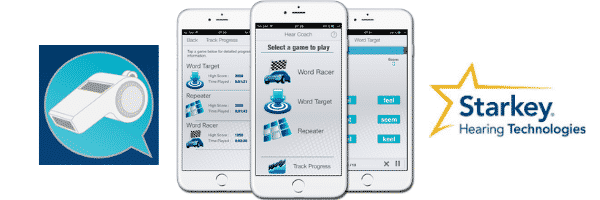
We hear with our ears. When we begin to lose some of our hearing, properly-fitted hearing instruments can help us hear many of the sounds that go missing. That’s the good news.
Here’s the not-so-good news. Hearing aids alone don’t solve a hearing problem because we hear with our ears BUT listen with our brain. Actively listening helps us connect to others and to life, but that takes effort. Put another way, we have to be intentional AND pay attention in order to make sense of what you are hearing. We all know that it takes work to listen but don’t always make the effort needed to truly listen.
So why should I train my brain to actively listen?
Another way to look at this question would be to ask, “Why should I exercise my brain?”
Based on ongoing research done by Frank Lin, MD, a renowned Otolaryngologist at John Hopkins Hospital,
- two-thirds of people aged 70 and older have hearing loss
- older adults with hearing loss have a 24% higher risk of cognitive impairment
- a 25dB hearing loss (mild hearing loss) is equivalent to a 7-year age decline in cognitive function
These are scary statistics but with the help of properly-fitted hearing aids, you can enhance your cognitive abilities rather than lose them!
MY REQUEST: Many of our Avalon clients tell me that they are not wearing their hearing aids as much since they are stuck at home, sheltering. Would you please put your hearing aids on for a minimum of 8 hours per day so that you exercise your ears and your brain? It’s important for your health and your well-being even if you are only listening to the air conditioning.
If properly-fitted hearing aids are like exercise machines for my brain, how can I best train my brain?
While the brain is wonderfully complex, it could be viewed as a muscle. If you don’t use it fully, it can lose efficiency and strength. From a listening and understanding perspective, the brain requires lots of stimulation so that it doesn’t get lazy and atrophy, just like the muscles of your body. This is where ‘physical therapy’ for your ears and brain come in.
Last week, I recommended that you read out loud to yourself while playing the radio or television in the background. Doing this for 10 minutes per day, twice a day, helps train your brain to separate the background noise from the conversation. I’m curious. Did you do it? I also promised you some other tools that act like physical therapy for your auditory system.
Here are some computer-based programs to train your ears and brain:
- The LACE Program
Just like physical therapy helps to rebuild muscles and strengthen your body when an injury or weakness has occurred, the LACE program can help you strengthen your listening and communication skills.
LACE trains you to listen more effectively in noisy situations such as a restaurant (speech in noise). It teaches you how to listen to fast talkers (rapid speech) and how to focus on one voice over another (competing voice). It also provides auditory memory and cognitive processing training. Through the Word Memory task, you get short and long term memory training, a great thing for your brain! The Missing Word exercises help you improve your processing speed by filling in the blanks through contextual cues.
You purchase the LACE program online for $99.99 and download it to your computer. Here is the link: https://neurotone.com/lace-interactive-listening-program
You do the program at your own speed but it is recommended that you complete the ten hour program over a four week period (20-30 minutes per day, 5 days per week). People who do this program report understanding 40% better in noisy situations!
- Hear Coach App
Hear Coach is a free suite of listening games designed to challenge your auditory skills. These fun, interactive games have been shown to improve your listening ability in noise, which in turn, can reduce the amount of effort needed for easier communication.
Hear Coach is an ‘app’ and must be downloaded into your smart phone or tablet from the App Store.
Take the Avalon Challenge – Aural rehabilitation with a human touch
If you would rather not play games online, you could be bold and take on this challenge!
Ask a friend or family member to read out loud to you. Play the TV or radio in the background at a low volume. Be intentional and pay attention as they read to you. Being read to can be a beautiful and soothing way to connect to another human being. Personally, it warms my heart, makes me feel closer to that person and reminds me of my childhood when my Mom would read to me.
Whether you choose a computer or a human, I hope you take 20 minutes per day to train your ears and your brain? It’s good for you, your listening skills and your relationships. And it’s a fun way to connect!


